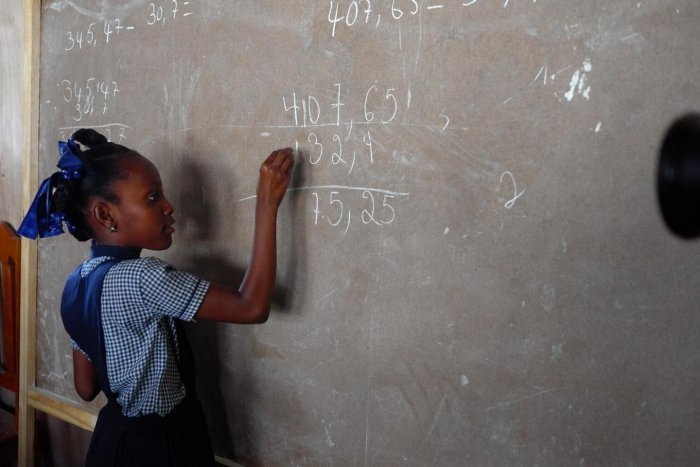After the earthquake, many children have found themselves without any opportunity to go to school in the immediate future
PORT-AU-PRINCE — The earthquake of 14 August 2021 in the Great South of Haiti had a considerable impact on school infrastructure. 906 schools were destroyed or partially damaged. Many children have found themselves without any opportunity to go to school in the immediate future. Efforts to rehabilitate and build schools began in a short period of time after the disaster but some parents decided to take their children to areas where the earthquake had not caused significant damage to allow them to begin or continue their education.
Île-à-Vache, 31 January 2022- The strident voices of schoolboys and schoolgirls fill the atmosphere. It’s recess time and some children sing while two young schoolgirls are encouraged by the songs in a skipping rope game. One of them, 8-year-old Beyoncé, has an unusual story.
Before, she lived in the city of Les Cayes, the departmental capital of the South in Haiti, where her school and her house were destroyed by the earthquake on 14 August 2021. She came to live in Île-à-Vache, a small island on the southern peninsula. Here, the earthquake made little damage. Schools have sustained minor impacts and children continue to go to class. “Before, I was at Claire-Heureuse school. My school was destroyed, and my parents took me here and enrolled me here,” she explains.
Beyoncé is a very dynamic, very bright little girl. She likes going to the blackboard to solve math exercises. Indeed, she says it loud and clear: her favorite subject is arithmetic. She likes doing calculations. She is happy with this opportunity that has been offered to her to continue her studies.
Thousands of children may interrupt their education
At first, the little girl found it difficult to adapt to her new environment. “I made new friends here. However, I miss my friends from Les Cayes a lot, and they miss me too,” she says. But that doesn’t stop him from working very hard in class. And after class, she learns her lessons and does her homework before going to play with her new friends.
More than 1,000 families have settled in Île-à-Vache to allow their children to start or continue their schooling. Several schools on the island have benefited from UNICEF support in teaching and didactic tools for teachers and office equipment, while children have received school kits and learning supplies. UNICEF has already distributed 20 000 school kits, started placing 900 temporary learning spaces in 150 schools.
The new school year officially began on 4 October in the Great South. For the moment, only 231 out of 1,250 schools have received school kits, leaving an estimated 250,000 children at risk of losing their education. UNICEF, in partnership with the Ministry of National Education and Vocational Training (MENFP), has identified the schools to be rehabilitated or rebuilt and the first phase of this work has begun, taking into account the standards of accessibility for people with disabilities.
More children going to school since January
UNICEF continues to distribute learner’ kits consisting of backpacks and learning materials such as notebooks, pens, erasers, rulers, etc. to over 11,200 children, and pedagogical kits to 206 teachers in 66 schools in the three departments affected by the earthquake. 80,000 additional kits were received in January and are being distributed.
“Although the earthquake of 14 August has had a negative impact on the education of children, many more children have returned to school during this month of January. To enable them to stay there and complete their learning cycles, the actions already undertaken should be scaled up,” said Bruno Maes, UNICEF Representative in Haiti.
Among the actions undertaken, there is the establishment of educational support programs, cash transfers to the most vulnerable families, access to new information and communication technologies, secured access to schools, to name but a few. “All of these actions will contribute to achieving Sustainable Development Goal number 4, aiming for inclusive quality education for all, by 2030,” he concludes.
UNICEF thanks all donors who contributed to the response effort to the earthquake of August 14, 2021, in Haiti: AECID, Argentina Natcom, Belgium Natcom, CAF, Canada, CERF, CFC Foundation, ECHO, ECW FER, France, GPE, IDB, Japan, LDSC, Lego Foundation (Danish Natcom), Liechtenstein, Luxembourg Natcom, MSC, Peru Natcom, Polish Natcom, SIDA – Sweden, Spanish Natcom, UNOCHA, USA Natcom, USAID and UUSA.
SOURCE: ReliefWeb



